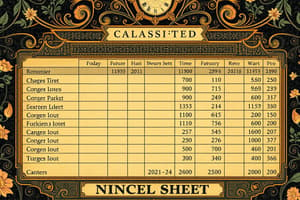Podcast
Questions and Answers
What are current assets?
What are current assets?
- Assets expected to be sold within one year (correct)
- Intangible assets
- Obligations due within one year
- Long-term investments
Define noncurrent assets.
Define noncurrent assets.
Long term investments, plant assets, and intangible assets.
What are long term investments?
What are long term investments?
Expected to be held for more than one year or the operating cycle.
What are plant assets?
What are plant assets?
Define intangible assets.
Define intangible assets.
What are current liabilities?
What are current liabilities?
What defines long term liabilities?
What defines long term liabilities?
What is equity?
What is equity?
Which of the following is an example of a current asset?
Which of the following is an example of a current asset?
What is an example of a long term investment?
What is an example of a long term investment?
Which of these is considered a plant asset?
Which of these is considered a plant asset?
A long term investment in stock is considered a ______.
A long term investment in stock is considered a ______.
______ are obligations due within one year.
______ are obligations due within one year.
Flashcards are hidden until you start studying
Study Notes
Current Assets
- Expected to be sold, collected, or used within one year or the operating cycle.
- Includes cash, accounts receivable, prepaid expenses, and supplies.
Noncurrent Assets
- Consists of long-term investments, plant assets, and intangible assets.
- Held for more than one year or beyond the operating cycle.
Long-Term Investments
- Expected to be retained for over one year or the longest operating cycle.
- Includes notes receivable, land not used in operations, and long-term stock investments.
Plant Assets
- Tangible, long-lived assets used for producing or selling products and services.
- Typically subject to depreciation.
- Examples include equipment, buildings, land, and automobiles.
Intangible Assets
- Long-term resources that do not have physical form and derive from rights and privileges.
- Examples include goodwill, franchises, and trademarks.
Current Liabilities
- Obligations due within either one year or the company's operating cycle.
- Includes accounts payable and unearned revenue.
Long-Term Liabilities
- Obligations that are not due within one year or the operating cycle.
- Example includes notes payable.
Equity
- Represents the owner's claim on the company's assets.
Other Current Assets
- Cash: The most liquid asset.
- Accounts Receivable: Money owed by customers for goods or services.
- Prepaid Expense: Payments for services to be received in the future.
- Supplies: Consumable items used in operations.
Other Plant Assets
- Equipment: Used in production or service delivery.
- Building: Structures utilized for business operations.
- Land: Real property held for operational or investment purposes.
- Automobiles: Vehicles used for business functions.
- Accumulated Depreciation: Represents the total depreciation of plant assets over time.
Other Intangible Assets
- Goodwill: Value derived from a company's reputation and customer relations.
- Franchise: Rights granted to sell products or services of a larger company.
- Trademarks: Recognizable signs, designs, or expressions defining a brand.
Studying That Suits You
Use AI to generate personalized quizzes and flashcards to suit your learning preferences.




